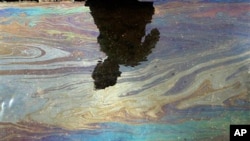For months, a virtual navy has been stationed in the Gulf of Mexico. Comprised of both professionals and new enlistees, this flotilla has been hard at work to clean up the massive oil spill from British Petroleum's Deepwater Horizon well that blew out earlier this year.
But they're not the only ones at work. With hundreds of names too difficult to pronounce, microscopic organisms are doing their part to clean up the Gulf oil spill.
"Microbes are everywhere quite basically," says Ed Bouwer, professor of environmental engineering at Johns Hopkins University. "They are there, sort of stable, humming along, so to speak. Then the food is there, the oil, but there are no nutrients. So once the nutrients and oil are put together with oxygen, then they are having a feast. Oil to them is like sugar to us."
The U.S. Coast Guard has directed dozens of skimmers to collect the oil spilled by the Deepwater Horizon oil rig, and hundreds of crews are out mopping up what they can from the Gulf. But, says Bouwer, you should not underestimate the power of Mother Nature.
"Biodegradation is a very fast process for oil. If the right conditions are there, meaning there is fertilizer, nutrients, there is oxygen and the microbes are pretty plentiful. There is a lot of different bacteria that can use oil as their food and they can do it pretty quickly."
Bouwer says conditions in the warmer waters of the Gulf of Mexico help promote natural biodegradation. According to NOAA, that, along with skimming, burning and direct capture, accounts for removal of about 75-percent of the escaped oil.
But oceanographer Randy McBride believes it is too early to tell what is actually going on in the Gulf.
"In some ways, we've lost control of the spill because it is so three-dimensional, and no longer two-dimensional," he cautions. "It's very hard to track it and determine where the oil is. I think that through continued research and sampling, we're going to find out a lot more about this spill over time."
McBride was a scientific consultant for the cleanup of the 1989 Exxon Valdez oil tanker spill. He says it could take months, years, or even decades to understand the full impact of the Gulf oil spill. The reason, he says, may be the quantity of chemical dispersants used.
"Compared to the Exxon Valdez spill, (which) was very much a two-dimensional spill, where the vast majority of the spill was on the surface of the water and on the shoreline. In the Gulf of Mexico, there was and is some oil on the surface and on the shoreline, but it is also throughout the water column because of the dispersants."
McBride says remote sensing techniques that look at the surface of the water are not going to detect all of the oil, which, he says, may eventually make its way into the northern Atlantic Ocean.
"Through time, and it has already happened, I would imagine a certain amount of oil has been incorporated into the (ocean) loop current and will be dispersed out into the Atlantic (Ocean) and towards, of all places, Great Britain and Ireland."
And there is still a fair amount of disagreement among scientists about just how much oil is hidden in the Gulf. Marine researcher Chuck Hopkinson of the University of Georgia finds the NOAA numbers far too optimistic. Estimates by him and a number of colleagues reverse the numbers, saying as much as 75-percent of the oil is still in the Gulf's waters.
Whichever estimate is more accurate, Ed Bouwer says the good news is, no matter where it goes, oil-eating microbes will follow.
"It has dispersed and traveled great distances. But it will eventually biodegrade. The material that is dispersed of low molecular weight, Mother Nature is pretty good at purifying that kind of compound."
Mother Nature and the remediation crews at work have big work ahead of them. Estimates vary, but analysts say 700 million liters of oil - or more - may have spilled into the Gulf of Mexico.




